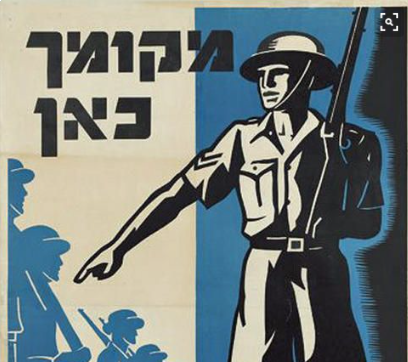January 17th, 1950, marked the establishment of a commission to investigate one of the most sordid scandals in Israeli history. The Frumkin Commission, headed by former Supreme Court Justice Gad Frumkin, was a state commission of inquiry charged with investigating “educational matters in the immigrant camps.” Its purpose was threefold: (1) “To investigate all accusations concerning religious coercion in the immigrant camps”, (2) “To clarify the accusations published in the press and those responsible for them”, and (3) “To examine the sources of the propaganda abroad concerning the accusations in question.” The third purpose was, according to Dr. Zvi Zameret (The Melting Pot), an exercise in deflection. “According to Prime Minister David Ben-Gurion, the Commission was to determine ‘the source of agitation in America.’ Evidently Ben-Gurion and his colleagues hoped to pin the blame on certain persons or movements.”
In 1949, the peak year for immigration, “Israel” absorbed approximately 111,000 new immigrants. 47 percent of that year’s total came from North African or Middle Eastern countries. The start of 1949 to mid-1950 is generally known as the beginning of the immigrant camps, which were frequently kept under governmental lock and key. At the beginning of 1949 28,000 lived in immigrant camps, by mid-year, that number had grown to 60,000, and the total reached 100,000 by the end of the year. Dr. Giora Josephtal, then head of the Absorption Department of the Jewish Agency, told other Mapai (Labor Party) members that of that 100,000 approximately 75% were immigrants from Islamic countries, other living under extremely difficult conditions. Many were housed in tin-roofed cinderblock huts, tents or other makeshift structures, many of which were deemed fit only for storage by the recently departed British Mandate. The British would never have thought to house human beings under such conditions. In addition, sanitary conditions in the immigrant camps were, according to all opinions, atrocious: entire camps, housing thousands of immigrants, were put up with hardly any plumbing, with only a few water faucets, without showers, and with scant toilet facilities. It was under these trying circumstances that thousands waited to see what fate “Israel” would decide for them.
All of this was taking place in an environment rife with anti-religious sentiment and condescension towards Jews from North Africa and the Middle East. The “last refuge” of the Jews turned out to be far less inviting than the one Jewish Agency representatives had portrayed in their Aliyah campaign visits to Algeria, Yemen, Iraq, Morocco, etc. The scene was somewhat less messianic and romantic, especially for those Jews who hailed from what Ben-Gurion and other Mapai members termed “primitive” lands. The overall Geist of “Israel” at the time attached a severe stigma to these immigrants who, in the vast majority of cases, moved to the nascent state out of necessity rather than political conviction. Their countries of residence had been made uninhabitable, in large part due to Zionist provocations, so they made their way to the only country that was allowed to welcome them. For their part, “Israel” was happy to use them as border cannon fodder.
The situation understandably led to mass disillusion amongst the immigrants, who in many cases had led normal, prosperous lives in their countries of origin. To top it off, they were now the official disdained minority, a useful scapegoat for the new government. Haaretz columnist Aryeh Gelblum deftly painted public and governmental opinion of the time.
“We have here an extremely primitive people. The level of their education borders upon total ignorance, and even more serious is their total inability to comprehend anything spiritual…Unlike the Yemenites, they also lack roots in Judaism…(they) are entirely subject to the play of the most primitive and wild instincts.”
Dr. Zameret explains, “Few of the new immigrants responded to these accusations. One of them, the founder of a Zionist association in Agadir and Tangiers, related his own severe personal hardships, noting that: ‘My situation was complicated by my being a Moroccan, for as such I can barely open my mouth to speak since people see me ab initio as a kind of habitual criminal.’”
Some may claim that this was simply normal societal friction being manifested in a new, immigrant country where tensions were bound to occur. However, Ben-Gurion’s own words hint towards prejudice at the highest echelons of government. Rabbi Yaakov Shapiro succinctly explained the esprit de l’époque in reference to the army, but his words can be just as easily applied to countless other historical instances. He says: “Ben-Gurion called the Israeli army a ‘melting pot.’ He said it was designed to – quote – ‘clean, refine and purify’ the Jews of their ‘foreign garbage’; to ‘educate’ them and provide them ‘cultural elevation.’”
Though the commission greatly downplayed the extent of anti-religious coercion amongst Jewish immigrants from Islamic countries in the transit camps, even they couldn’t save enough face to prevent a vote of “no-confidence” from toppling “Israel’s” first elected Knesset coalition government in the months following the publishing of the commission’s findings. Their downplaying was incriminating enough.
Coming Soon: Part II – Frumkin Commission Findings
tags:

